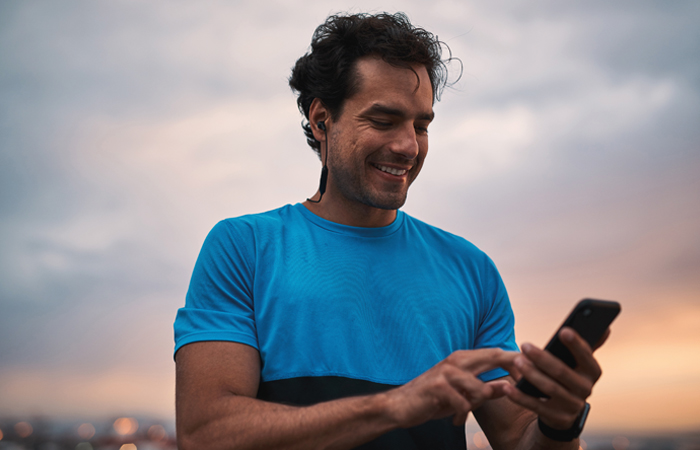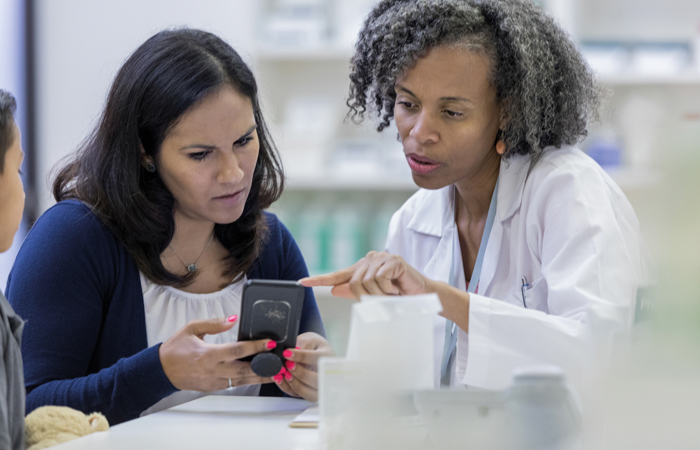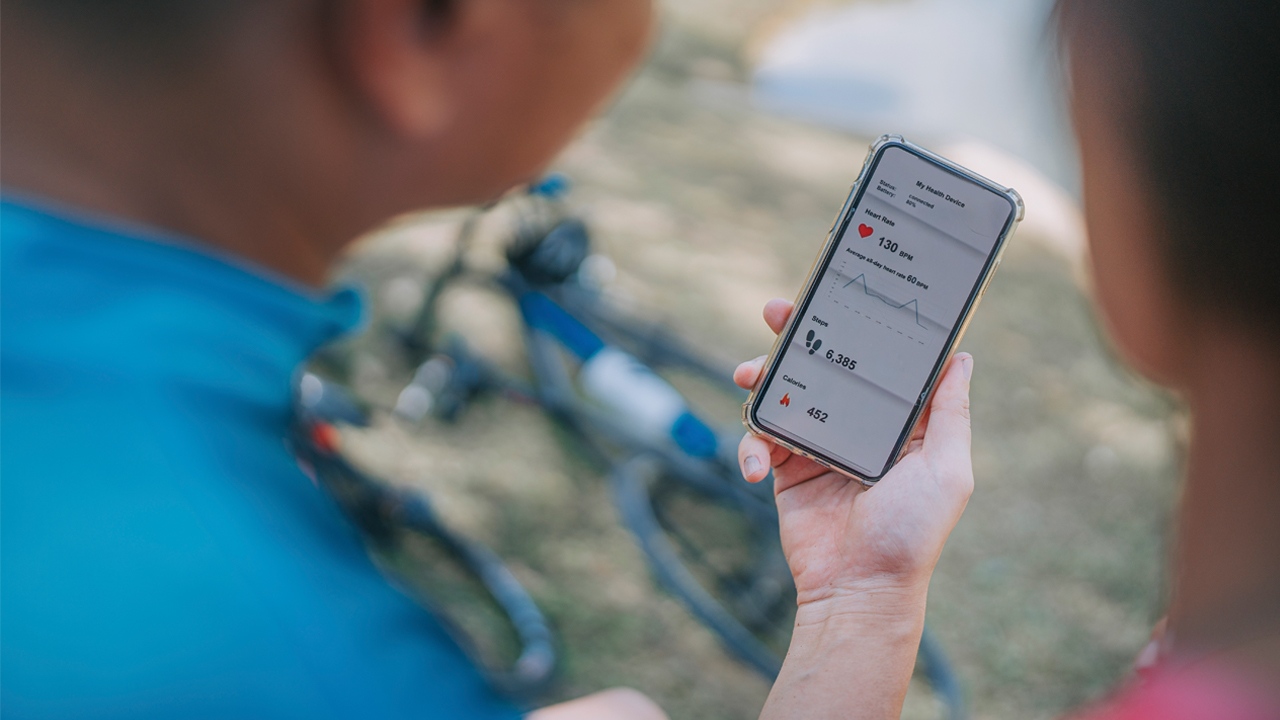In OTC
Follow this topic
Bookmark
Record learning outcomes
In July 2023, a survey by the Organisation for the Review of Care and Health Apps (ORCHA) revealed that 68 per cent of people agree that digital health apps should be used within the NHS. Nearly half of everyone surveyed said they were already using a health app to self-manage their health.
Research by ORCHA in 2022 found that 83 per cent of people surveyed who had used a health app found it actively helped to improve their health and wellbeing. Some 55 per cent were using an app recommended by a healthcare professional, mainly GPs or pharmacists. In addition, people aged 18-44 said they would choose digital health to support a mental health condition over and above prescription medicines, such as an antidepressant.
“Great health apps are, right now, being prescribed by doctors to help their patients sleep better, manage their mental health, keep fitter, monitor medicine usage, and much more,” says Liz Ashall-Payne, founding CEO of ORCHA. “But all of us need better advice on how to choose a good-quality app. Consistently, more than half of the health apps we review fail to reach the standard required to be used by the NHS.”
Health apps and digital technology already play a significant role within healthcare. The NHS Long-Term Plan, published in 2019, expected that by 2029, people will be “helped to stay well, to recognise important symptoms early, and to manage their own health, guided by digital tools”. According to the Deloitte Centre for Health Solutions in October 2021, it is hoped that eventually health apps will become part of digitally enabled care pathways, broaden access to healthcare services, and improve the outcomes of current treatments.
App benefits
A National Institute for Health and Care Excellence (NICE) guideline on ‘Behaviour change: digital and mobile health interventions’ published in October 2020, stated that using mobile apps may help people change their behaviour, which may in turn help to improve their health: “Addressing health-related behaviours such as those relating to physical activity, smoking and alcohol intake can help reduce the risk of developing chronic conditions such as diabetes, cardiovascular diseases, respiratory conditions, cancer and liver disease. Digital and mobile interventions may also help people to self-manage, self-monitor or improve these behaviours and improve their mental, social and emotional wellbeing.”
Many people are using health tracking apps to improve their lifestyle and maintain healthier habits and there is a vast range of health tracking apps available. This includes calorie counting and weight management, fitness and exercise, periods and menstrual cycle, menopause symptoms, alcohol intake, sleep, mental health, and chronic conditions management. In August 2023, research at the University of British Columbia (published in JAMA Psychiatry) revealed that using exercise apps to track simple home workouts can help to reduce symptoms of depression and burnout.
“Health tracking apps offer immediate benefits by giving users insights into their daily habits like diet, exercise and sleep,” says Liz. “These insights allow for quick adjustments to improve health in the short term. Over time, consistent use of these apps leads to a deeper understanding of personal health patterns.”
Kantar research in October 2022 revealed that, overall, 39 per cent of people see improvements in their physical and emotional health when they monitor them with the support of technology. In addition, 78 per cent of health-conscious consumers believe that the social and community components embedded in fitness apps make it easier to practise healthy habits.
According to ORCHA research, people are 70 per cent more likely to use an app when a healthcare professional has recommended it and thus many health tracking apps could be used with the direct support of a healthcare professional – such as the community pharmacy team. Monitoring sleep patterns, for example, may help pharmacy teams suggest suitable self-help measures or over-the-counter (OTC) products.
“Self-tracking apps provide a self-monitoring aspect that can be an important component of sticking to a health programme,” says Kenny Chan, Numark lead information pharmacist. “With the help and guidance of pharmacists, these can be useful in empowering patients to take control of their own health. There is such a wide range of apps available that it should be easy to find one to suit their needs.”
Pharmacy focus
Liz says that pharmacy teams can educate customers on how to effectively use health tracking apps to monitor their health metrics and achieve their health goals. “Pharmacy teams can follow up with customers periodically to monitor their progress and provide ongoing support and encouragement,” she says. “This could involve reviewing updated health data from the tracking apps, adjusting recommendations as needed, and celebrating milestones achieved. Overall, by actively engaging with customers who use health tracking apps, pharmacy teams can play a valuable role in promoting health and wellness, guiding customers toward suitable, trusted and effective products.”
Pharmacy teams may be able to incorporate a health app into existing services, such as smoking cessation or weight management. “For people at risk of developing type 2 diabetes, heart disease or stroke, the use of health tracking apps can be particularly impactful,” says Liz. “By monitoring key metrics like blood sugar levels, cholesterol, blood pressure and weight, these apps empower users to make proactive lifestyle changes aimed at reducing their risk factors.”

Apps can empower users to make proactive lifestyle changes aimed at reducing their risk factors.
The NICE guideline in October 2020 warned that the effectiveness of health tracking apps can vary, however, and that they may not be suitable for everyone. For example, healthcare professionals should look out for people at risk of developing or resuming an eating disorder or other unhealthy behaviour (such as excessive exercise) while using a diet or exercise app. Some people who are trying to stop smoking may benefit more from direct, personalised text messaging rather than a general stop smoking health app. Health apps should also not be used to replace health advice from a healthcare professional.
“Health tracking apps can be useful when diagnosing and monitoring patient health,” says Kenny. “They have the capability to back up what, in the past, would have been an anecdotal description of symptoms. Pharmacists should remember that apps are only one tool and it’s still important to conduct thorough consultations when determining whether there’s an underlying health concern or lifestyle change needed. They can also be signposted as a tool for those looking for methods of taking control of their health and implementing advice given by pharmacists.”
Health tracking apps are increasingly being used in the self-management of chronic conditions to help patients make appropriate lifestyle changes and track their progress. Pharmacy teams could use this data to signpost patients via referral pathways to a GP or relevant healthcare professional, or provide relevant self care advice. An app can be used to monitor migraine symptoms and look for potential migraine triggers (in the same way as a symptoms diary). Healthcare apps may also help to monitor whether treatments or self-management approaches are working effectively. For example, Versus Arthritis charity has developed Arthritis Tracker, a free app for people aged 13-25, to help them rate their daily symptoms (pinpointing where the pain is on their body and how bad it is) along with energy levels, sleep, activity, emotions and medication side effects.

Sleep tracking apps can track the time it takes someone to fall asleep and the length of deep sleep.
Choosing apps
According to ORCHA research in 2022, only 20 per cent of the 320,000 health apps available on the market at the time were safe to use. Many apps collect personal data and have the potential to use and share it as well. The ORCHA survey in July 2023 revealed that most people aren’t checking an app’s clinical credentials or privacy policy before they download it, instead relying on consumer reviews in the app stores.
“That’s the equivalent of buying a random box of pills with no MHRA (Medicines and Healthcare products Regulatory Agency MHRA) approval and swallowing a handful of them, hoping for the best,” says Dr Simon Leigh, ORCHA’s research director. “We’ve proven through academic studies that good consumer reviews are not a safe indicator of the quality of the app. In fact, as a rule, the higher starred the consumer reviews, the less compliant the apps are in terms of the required standards and accreditations. Consumers are putting far too much faith in anecdotal observations by others.”
ORCHA has launched a Digital Health Formularies product for healthcare professionals, to help them recommend complex apps and monitor their use by patients. The ORCHA Health App Libraries product contains health apps that are safe for patients to download and use without any medical help and is being used by various NHS trusts to create their own online Health and Wellbeing App Library.
ORCHA’s Think SAFE campaign helps to remind the public of the following guidelines before they download an app:
● SECURE – how secure is the app and does it have a clear privacy policy?
● ASK – have I asked a healthcare professional about this app choice?
● FIND – where did I find this app?
● EVIDENCE – does the app demonstrate clear evidence it was developed by someone with medical expertise.

Translation apps can be useful tools in overcoming language barriers in the pharmacy.

